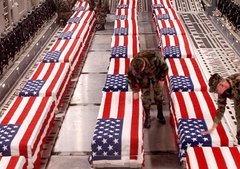Back in May of 2007, President Bush said that if Iraq asked the United States to leave, we would leave. Well, yesterday, Iraq did just that, they asked us to set a timetable to leave Iraq. Will Joe Knollenberg and his Republican colleagues in the U.S. House help us do what President Bush pledged to do in 2007? I don't think so, do you?
July 8, 2008
Iraq Prime Minister Nouri al-Maliki demands US withdrawal timetable
Iraqis want an end to the immunity that US troops have from prosecution
James Hider in Baghdad
Iraq said for the first time yesterday that it wanted to set a timetable for the withdrawal of US troops from its territory.
President Bush has long resisted a schedule for pulling his 145,000 soldiers out, arguing that it would play into the hands of insurgents. Nouri al-Maliki, the Shia Prime Minister, who boasted last week that he had crushed terrorism in the country, suggested that it was time to start setting time-lines.
“The current trend is to reach an agreement on a memorandum of understanding either for the departure of the forces or to put a timetable on their withdrawal,” Mr al-Maliki said during a visit to the United Arab Emirates. He rejected efforts by Mr Bush to hurry through an agreement on vital issues such as the immunity of US troops in Iraq and use of the country’s airspace. Mr Bush had hoped to sign a Status of Forces Agreement (SOFA) by the end of July to establish the basis for a long-term presence of US troops in the country.
The Iraqi parliament has bridled at pushing through such a binding deal with the outgoing and unpopular Bush Administration, saying that the negotiations have been secretive and could undermine Iraq’s sovereignty. “I don’t know anything about this agreement and neither does parliament,” said Ezzedine Dawla, a Sunni MP. “We’re going to pass something we don’t know anything about.”
Mr al-Maliki’s announcement showed a growing self-confidence that Iraqi leaders can stand up to their powerful ally. His oil minister said last week that leading Western oil companies would not be allowed to set conditions for future deals over Iraq’s main natural resource. The tough stance also comes before Iraqi provincial elections later this year, and may mark the start of the Prime Minister’s campaign to be reelected. His popularity was bolstered by military operations to take back the southern oil city of Basra and the town of al-Amarah from Iranian-backed Shia militias.
Click here for the rest of the story.
Subscribe to:
Post Comments (Atom)




No comments:
Post a Comment